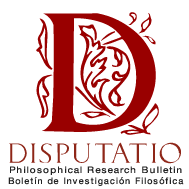P. D. Magnus
University at Albany, State University of New York, USA | pmagnus@fecundity.com
Received: 10-November-2018 | Accepted: 22-December-2018 | Published: 31-December-2018
Disputatio [Dec. 2018], Vol. 7, No. 8, a016 | DOI: 10.5281/zenodo.2553734
Article | [EN] | Full Text | Statistics | Copyright Notice [es] | Vol. 7 No. 8
How to cite this article:
Magnus, P. D. (2018). «How to be a realist about natural kinds». Disputatio. Philosophical Research Bulletin 7, no. 8: a016.
Abstract | Although some authors hold that natural kinds are necessarily relative to disciplinary domains, many authors presume that natural kinds must be absolute, categorical features of the reality —often assuming that without even mentioning the alternative. Recognizing both possibilities, one may ask whether the difference especially matters. I argue that it does. Looking at recent arguments about natural kind realism, I argue that we can best make sense of the realism question by thinking of natural kindness as a relation that holds between a category and a domain.
Keywords | Natural Kinds · Realism · Anti-realism.
![]()
Cómo ser un realista sobre especies naturales
Resumen | No obstante de que algunos autores sostienen que especies naturales son necesariamente relativas a los dominios de disciplinas, hay muchos autores que suponen que especies naturales tienen que ser características absolutas, categóricas de la realidad — suponiéndolo sin siquiera hacer mención de la alternativa. Pero una vez que se reconozcan ambas posibilidades, uno se podría preguntar si la diferencia es particularmente importante. Yo arguyo que sí. Con remisión a argumentos recientes arguyo que la cuestión del realismo se ilumina de la mejor manera si pensamos de la especiedad natural como de una relación que se da entre una categoría y un dominio.
Palabras Clave | Especies naturales · Realismo · Anti-realismo.
References
Bird, Alexander Bird and Emma Tobin (2015). “Natural kinds”. In Edward N. Zalta, editor, The Stanford Encyclopedia of Philosophy, Spring. url: http://plato.stanford.edu/archives/spr2015/entries/natural-kinds/
Boyd, Richard [N.] (1982). “Scientific realism and naturalistic epistemology”. PSA: Proceedings of the Biennial Meeting of the Philosophy of Science Association (1980), vol. 2: pp. 613–662.
Boyd, Richard [N.] (1990). “Realism, approximate truth, and philosophical method”. In C. Wade Savage, editor, Minnesota Studies in Philosophy of Science, vol. XIV, pp. 355–391. University of Minnesota Press, Minneapolis.
Boyd, Richard [N.] (1991). “Realism, anti-foundationalism and the enthusiasm for natural kinds”. Philosophical Studies 61: pp. 127–148.
Boyd, Richard [N.] (1999a). “Homeostasis, species, and higher taxa”. In Robert A. Wilson, editor, Species: New Interdisciplinary Essays, pp. 141–185. The MIT Press, Cambridge, Massachusetts.
Boyd, Richard [N.] (1999b). “Kinds as the “workmanship of men”: Realism, constructivism, and natural kinds”. In Julian Nida-Rümelin, editor, Rationalität, Realismus, Revision: Proceedings of the Third International Congress, Gesellschaft für Analytische Philosophie, pp. 52–89, Berlin. Walter de Gruyter.
Franklin-Hall, L. R. (2015). “Natural kinds as categorical bottlenecks”. Philosophical Studies 172, no. 4: pp. 925–948, April. https://doi.org/10.1007/s11098-014-0326-8
Godman, Marion (2014). review of Scientific Enquiry and Natural Kinds: From Planets to Mallards. International Studies in the Philosophy of Science 8, no. 3: pp. 343–346. https://doi.org/10.1080/02698595.2014.953346
Goodman, Nelson (1978). Ways of Worldmaking. Hackett Publishing Company, Indianapolis.
Hacking, Ian (1991). “A tradition of natural kinds”. Philosophical Studies 61: pp. 109–126. https://doi.org/10.1007/BF00385836
Hacking, Ian (2007). “Natural kinds: Rosy dawn, scholastic twilight”. Royal Institute of Philosophy Supplement 82: pp. 203–239. https://doi.org/10.1017/S1358246107000203
Harman, Graham (2010). Towards Speculative Realism. Zero Books, Winchester, UK.
Hendry, Robin Findlay (2010). “The elements and conceptual change”. In Helen Beebee and Nigel Sabbarton-Leary, editors, The Semantics and Metaphysics of Natural Kinds, pp. 137–158. Routledge, New York.
Khalidi, Muhammad Ali (2013). Natural Categories and Human Kinds. Cambridge University Press. https://doi.org/10.1017/CBO9780511998553
Khalidi, Muhammad Ali (2016). “Mind-dependent kinds”. Journal of Social Ontology 2, no. 2: pp. 223–246. https://doi.org/10.1515/jso-2015-0045
Magnus, P.D. (2012). Scientific Enquiry and Natural Kinds: From Planets to Mallards. Palgrave MacMillan, Basingstoke, Hampshire. https://doi.org/10.1057/9781137271259
Magnus, P.D. (2014a). “Epistemic categories and causal kinds”. Studies in History and Philosophy of Biological and Biomedical Sciences 48, B: pp. 263–266, December.
Magnus, P.D. (2014b). “No grist for Mill on natural kinds”. Journal for the History of Analytical Philosophy 2, no. 4: pp. 1–15. https://doi.org/10.15173/jhap.v2i4.35
Peirce, Charles Sanders (1877). “How to make our ideas clear”. In Nathan Houser and Christian Kloesel, editors, The Essential Peirce, vol. 1, pp. 124–141. Indiana University Press, Bloomington, 1992. Originally published 1877.
van Fraassen, Bas C. (1980). The Scientific Image. Clarendon Press, Oxford, 1980. https://doi.org/10.1093/0198244274.001.0001
© The author(s) 2018. This work, published by Disputatio [www.disputatio.eu], is an Open Access article distributed under the terms of the Creative Commons License [BY–NC–ND]. The copy, distribution and public communication of this work will be according to the copyright notice. For inquiries and permissions, please email: boletin@disputatio.eu.
